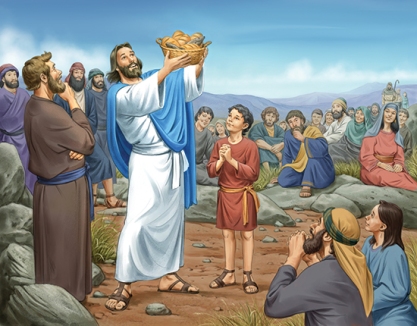Reflection for 21st
Sunday in Ordinary Time, Year A
(Is 22:19-23; Rm
11:33-36; Mt 16:13-20)
What is the common problem we face
in delegating authority? This precaution appears in every human gathering, even
in family circles. Transmitting and entrusting authority to another person is
easier said than done. But we see Jesus in the Gospel of this Sunday freely entrusting the authority-keys of the Kingdom of Heaven of Peter.
This happened in fulfilment of the
prophecy of Isaiah in the first reading, where the Lord handed over to Eliakim
the authority of Shebna over Jerusalem and the house of Judah. “And I will
place on his shoulder the authority of the house of David; he shall open, and
none shall shut; and he shall shut, and none shall open.” Jesus would use
similar words on Peter as they enter the district of Caesarea Philippi.
According to biblical historians, Caesarea
Philippi was originally known as Panion. The City was located on the southern
slope of Mount Hermon near the River Jordan. Emperor Augustus Caeser put the
district under Herod the Great. Herod’s son, Philip, rebuilt the City and
changed the name to Caesarea Philippi. This was how a Jewish territory took on
a Roman identity. On entering this City, Jesus threw in the question of his own
identity to His disciples.
He asked them, “Who do people say
that the Son of man is?” People identified Him by comparing Him with the holy
men and prophets of old. This was based on the impression they got from his
miracles and teaching authority. So, they likened Jesus to be another John the
Baptist, Elijah, Jeremiah, etc. People will always describe others on these two
principles of ‘comparison’ and ‘selfish impression.’ Often times, they want you
to remain in these ‘identity modes’ they created. Now, Jesus looked at the disciples
and asked, “But who do you say that I am?” Peter’s response was immediate and
complete: “You are the Christ, the Son of the living God.”
Jesus said to him, “Blessed are you,
Simon Bar-Jona! For flesh and blood has not revealed this to you, but my Father
who is in Heaven.” Yes, no one knows the Son except the Father and those who the
Father chooses to reveal Him (Mt 11:27). Peter as flesh and blood was
vulnerable, but his humility and openness to the Father earned him the exalted
knowledge of the Son. If our lives are consumed by the pleasures of ‘flesh and
blood’ we will definitely lack that true knowledge of Jesus, ourselves and things
around that only God gives, even in the midst of changing times and situations.
Having blessed Peter, Jesus added, “And
I tell you, you are Peter, and on this rock I will build my Church, and the
gates of Hades shall not prevail against it.” ‘Peter’ is now instituted as the foundational rock on which the Christian faith is to be sustained. Just as the Father’s
revelation was made known through him, Jesus the Rock of Ages will sustain His Church
through Peter. “The Lord is my rock and fortress...I take refuge in Him, my
rock” (Ps 18:2).
Further, Jesus said to Peter, “I
will give you the keys of the Kingdom of Heaven, and whatever you bind on earth
shall be bound in heaven, and whatever you loose on earth shall be loosed in Heaven.”
Jesus now transmits His own authority to Peter, whom He instituted as the
foundational rock of the Church. Thus, the Church possesses within her the ‘sanctifying
office’ through which the heavenly gates are unlocked for Christ’s faithful. Therefore,
it is Christ who blesses when the Church blesses...
The authority of Jesus the Son of
the living God, the Head of the Body the Church, is not diminished by His
delegating His authority to Peter. Instead, in Peter, the Church possesses the ‘mind
of Christ’ and speaks with the ‘voice of Christ.’ It is always the Church of
Jesus Christ, with His power and authority. Moreover, the authority of ‘Peter’
the Head is not diminished when he delegates to Cardinals, Bishops, priests,
deacons and ministers in the Church. But the one authority of Jesus Christ is spread
out, and made readily available and accessible to all. So, in the blessing of
the deacon we receive the blessing of Jesus.
Then, why are people afraid of
delegating the little authority they possess? Every genuine authority issuing
from God leads back to God, and is not afraid of transmitting itself to others.
The fear of delegation is that the recipient might diminish the power of his
master, and divert the ‘glory’ to himself. This happens when we operate as ‘flesh
and blood.’ Lack of trust has ruined many relationships, families and
institutions. We often live in fear and suspicion of each other. If the
authority you have is not given by flesh and blood but by the living God, no
one can diminish it nor take it away, rather, it will spread out and leads those
it touches to salvation.
Fr Jude Chinwenwa Nwachukwu, C.Ss.R
Saints Peter & Paul Catholic
Church,
Tedi-Muwo, Lagos.
Sunday 23rd August, 2020.
www.nwachinwe.blogspot.com



